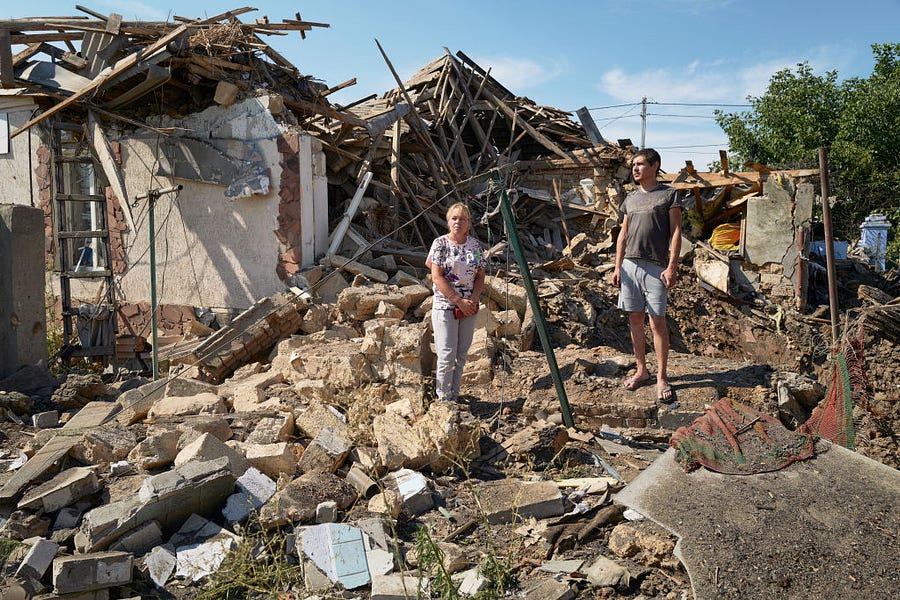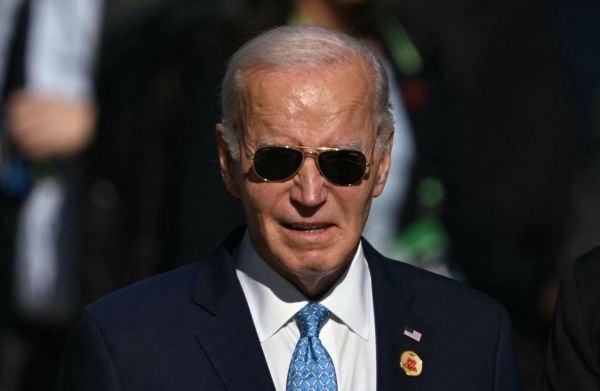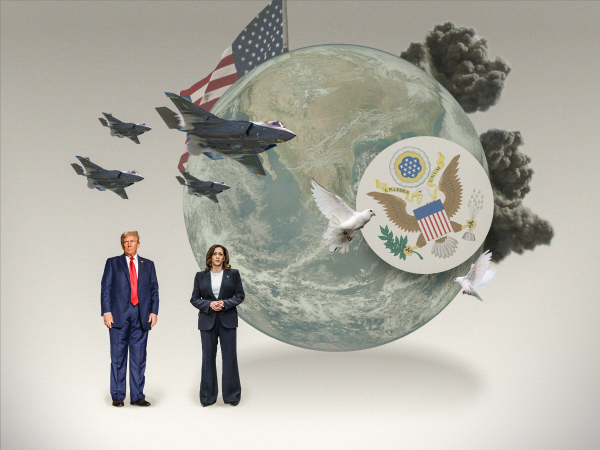The duly elected mayor of the occupied Ukrainian city of Kherson, Ihor Kolykhaev, set off for work for the final time on the morning of June 28. When he arrived at a makeshift city council building, armed assailants allegedly handcuffed him, searched his belongings, and took him away in a bus marked with the letter “Z”—the insignia of the Russian military.
In a Telegram post following the mayor’s arrest, Kirill Stremousov—deputy head of the Russian puppet administration in Kherson—accused Kolykhaev of espousing nazism and hoarding the region’s wealth: “In spite of everything, we are going to Russia and in the near future we will regain our Motherland, from which we all come. The Kherson region will never return to the environment of Nazism, debauchery and cynicism.” In Ukraine’s southern regions and elsewhere, Moscow and its local partners have used charges of fascism to justify violence against civilians and other war crimes.
Kolykhaev hasn’t been seen in the 27 days since. “We are all in danger. Everything is under attack,” an advisor, Galina Liashevska, wrote on Facebook. “I fear for the life of Igor Kolykhaev.”
In the five months since Russian President Vladimir Putin plunged eastern Europe into an all-out war, Moscow has deployed increasingly repressive tactics to solidify its fragile hold on the territory it hijacked early in the invasion: establishing local puppet governments, purging Ukrainian nationalists and political figures, sending Ukrainian citizens to Russia for ‘Russification,’ and laying the groundwork for annexation.
The planned trajectory of Moscow’s evasively named “special military operation”—to decapitate Kyiv’s sitting government in a swift onslaught—failed in short order. In April and after incurring heavy losses, the Russian military pulled back from Ukraine’s north to refocus its war effort on the eastern and southern regions. But even as the fighting’s frontlines shifted away from the capital, Russia’s strategic driver remained the same: to dismantle Ukraine’s national identity regardless of the human cost.
“Ukraine as it was can’t continue to exist,” Margarita Simonyan, editor-in-chief of Russian state-owned RT, said during a recent television appearance. “There’ll be no Ukraine we’ve known for many years.”
Vladimir Solovyov, the program’s host and another well-known Kremlin propagandist, responded with an analogy: “When a doctor is deworming a cat, for the doctor, it’s a special operation. For the worms, it’s a war. And for the cat, it’s cleansing.”
The exchange about Putin’s military offensive—a campaign he claimed to have launched to prevent genocide—comes amid attempts by Russia to legally, politically, and culturally Russify swaths of its southern neighbor by force. Last week, White House national security spokesman John Kirby confirmed rumors that Moscow harbored plans to annex four Ukrainian oblasts under partial Russian control: Donetsk, Luhansk, Zaporizhzhia, and Kherson. Absorbing the contiguous regions would link mainland Russia to the occupied Crimean Peninsula, which the Russian Federation annexed via referendum in 2014.
But Russia faces a far more hostile population in its latest attempts to prepare sham referenda, particularly in the southern oblasts of Kherson and Zaporizhzhia where opposition remains fierce. And it could be running out of time as Ukrainian forces use Western weapons to strike Russian military infrastructure in apparent preparation for a ground counteroffensive in the south.
On Thursday, Ukraine’s military claimed to have hit more than 200 Russian military targets in occupied areas of Kherson and Mykolaiv. The rocket and artillery fire reportedly destroyed six weapons depots and damaged Antonovsky bridge, a lifeline connecting Russian forces in Kherson to supplies and reinforcements from Crimea. Ukrainian troops have been inching toward the region’s occupied administrative capital of Kherson city for several months, liberating villages en route and urging civilians in Russian-held territory to evacuate.
“It looks like they’re prepared for a counteroffensive, but when exactly they’ll launch it is an open question,” explained Dmitri Alperovitch, the Russian-born co-founder of Silverado Policy Accelerator and former CTO of CrowdStrike, a leading cybersecurity firm.
Some analysts assess that Ukraine’s push south has created a sense of urgency for the Kremlin to formally pull occupied southern Ukraine into the Russian Federation. If the regions are illegitimately annexed, Russia could decry counterattacks by Ukrainian forces as affronts to Russian sovereign territory. “They can use this as leverage on the international level,” Olga Tokariuk, a Kyiv-based journalist and researcher, told The Dispatch.
In the Kherson and Zaporizhzhia oblasts, Russian-installed “military-civilian administrations” have already begun the work of issuing residents Russian passports, circulating the Russian ruble, opening local branches of Russian banks, and changing school curricula to include Russian language and history courses. Regional authorities have also shut down the Ukrainian telecommunications network, forcing locals to purchase traceable Russian SIM cards.
Over the weekend, Russian media reported that referendum commissions had been created in both Kherson and Zaporizhzhia. But whether the bodies can even lend minimal legitimacy to the planned annexations remains to be seen.
“There is this very strong partisan, insurgent movement, which wasn’t present in Crimea. It’s a very different situation from Crimea. Russia is trying to use the same playbook, but the situation on the ground is really different,” Tokariuk said. “They might declare this as their goal—to annex these territories—but whether they are actually able to do that, we are not sure.”
Part of the effort to integrate the regions politically includes rooting out Ukrainians considered hostile to the occupying regime. On Friday, Human Rights Watch published a report documenting sweeping abuse targeting the two regions’ civilian populations.
In an interview with The Dispatch, Neil Predmestnikov—a Kherson local—said Russians and their local collaborators compile lists of activists, police officers, and former military personnel to target for detention and torture. Some go missing for weeks at a time before their captors order them to flee the region or face indefinite imprisonment or death. Others are never seen again.
“They try to find activists, people with strong pro-Ukrainian positions,” Predmestnikov told The Dispatch, adding that Kherson’s population largely opposes the occupation despite Russia’s efforts to rid the city of outspoken rivals. “Propaganda doesn’t work when you’ve bombed the whole country.”
In other areas of occupied Ukraine, Russian forces are deporting civilians en masse. According to intelligence made public by the U.S. State Department, Russia has forcibly relocated an estimated 900,000 to 1.6 million Ukrainians—including around 260,000 children—to the Russian Federation. By Russian state media’s estimates, the number of “evacuations” could be as high as 2.5 million people, 407,000 of them children. In some cases the children were separated from their families, Ukrainian officials said. In others they were reportedly abducted from orphanages.
A 1948 United Nations convention outlines the parameters of genocide under international law, including “forcibly transferring children of the group to another group” with the “intent to destroy,” in whole or in part, the group targeted for displacement.
“No one will tell the exact numbers at the moment—all these deported people are deprived of means of communication, their documents are taken away from them, they are intimidated and taken to remote areas of Russia to make it as difficult as possible for them to return to their homeland,” Ukrainian President Volodymyr Zelensky said of the practice earlier this month. “How will we then take our people back from all those places where people were forcibly deported?”
If history is any indication, deported Ukrainians have a long road ahead of them. Under Joseph Stalin’s regime in 1944, Soviet Russia carried out a full-scale campaign to rid the Crimean Peninsula of its indigenous Tatar population. Around 200,000 people were deported from their homes and land, an estimated 8,000 of whom died en route to Central Asia.
The Tatars who remained or later returned faced another wave of Russian terror in 2014, when the Russian Federation invaded and annexed Crimea. According to United Nations estimates, around 10,000 people—mostly ethnic Tatars—fled the peninsula in 2014’s aftermath fearing Russian retribution. In both instances, the Kremlin encouraged the subsequent settlement of ethnic Russian families in Crimea to solidify its political and cultural hold on the peninsula. Experts warn this could be its plan for some occupied areas of mainland Ukraine.
“Deportation is just one of the elements of this genocide. They are repeating the same playbook that they used in the Soviet times, now in eastern and southern Ukraine. They are either destroying the cities by shelling and depriving them of the population this way—by killing the population, forcing the population to flee,” Tokariuk said. “If they want to keep the city intact, or after they destroy the cities like in Mariupol, they are deporting the population … That seems to be the goal, to create a new ethnic composition on this land.”
Recent rhetoric from Russian officials reinforces that notion.
Earlier this month, Dmitry Rogozin—Russia’s former deputy prime minister—described Ukraine as “an existential threat to the Russian people, Russian language, and Russian civilization” on Telegram, adding: “If we do not put an end to them, as, unfortunately, our grandfathers did not do away with them, we will have to die, but end up at an even greater cost to our grandchildren. So let’s get this over with. Once and forever. For our grandchildren.”
On Thursday, Russia’s former president and current chairman of its security council, Dmitry Medvedev, threatened that if the war continued apace, Ukraine may “disappear from the world map.”
Other Russian officials, meanwhile, couch their threats of escalation in ostensible security concerns. In an interview with RT last week, Russian Foreign Minister Sergei Lavrov accused Ukraine’s NATO backers of harboring a “desire to make things worse” for Ukraine and threatened to expand the scope of the conflict if military support for the Ukrainian armed forces continued. “We cannot allow the part of Ukraine controlled by Zelensky … to possess weapons that would pose a direct threat to our territory,” Lavrov said.
Using recently deployed U.S. precision-strike rocket launchers—high mobility artillery rocket systems, or HIMARS—Ukrainian forces have successfully targeted Russian ammunition depots, supply routes, and command posts from considerable distances. The systems played a critical role in driving Russian forces from Snake Island in the Black Sea.
Last Tuesday, the White House announced a new defense package to Ukraine, including 36,000 rounds of 105mm ammunition for howitzers and four additional HIMARS systems. Meanwhile, the Russian military is quickly depleting its own supply of sophisticated munitions, a U.S. defense official said Friday.
But some experts say Kyiv will require additional and new categories of Western weapons to recapture Russian-held territory in the east and south.
“HIMARS are an important tool, but just one tool. This war is not going to be won with HIMARS. You’re going to need a lot of weaponry—a lot of ammunition for traditional howitzers, a lot of rockets for multiple launch rocket systems. You’re going to need armored vehicles, you’re going to need small arms,” Alperovitch explained, adding that Ukraine’s air force also requires reinforcements.
In a reversal from the Biden administration’s previous position, the Pentagon is currently evaluating proposals to provide A-10 Warthog ground attack jets and training to bolster the Ukrainian fleet, U.S. Air Force Secretary Frank Kendall indicated Saturday.
Such support could dramatically alter the war’s course, and Russia knows it. In addition to its kinetic war in Ukraine, the Kremlin is waging what many deem a hybrid war on Kyiv’s Western backers via energy blackmail and a global food crisis. Andrey Kartapolov, head of Russia’s State Duma Defense Committee, admitted as much during a recent television appearance: “There’ll be no peace on [the West’s] conditions, much less on Ukraine’s made up conditions. It won’t happen. There will be an unconditional capitulation. Now Putin is using food, heat, lighting, gas as a weapon. We’ll probably start using children’s toys that way, too.”
The Ukrainian side now worries that Russia’s efforts to break Western resolve might push the international community toward another one-sided ceasefire agreement on par with the failed Minsk accords, which critics say effectively normalized Russian occupation-via-proxy in the two Donbas breakaway states in 2014 and 2015. A similar deal could give Russian forces needed respite to regroup and launch another offensive.
“Minsk I and Minsk II clearly proved to be unable to stop Russian aggression, because Russia demonstrated that it’s not just interested in the Donbas region of Ukraine,” Tokariuk said. “Russia’s goal is the complete destruction of Ukrainian statehood and the subjugation of Ukraine.”









Please note that we at The Dispatch hold ourselves, our work, and our commenters to a higher standard than other places on the internet. We welcome comments that foster genuine debate or discussion—including comments critical of us or our work—but responses that include ad hominem attacks on fellow Dispatch members or are intended to stoke fear and anger may be moderated.
You are currently using a limited time guest pass and do not have access to commenting. Consider subscribing to join the conversation.
With your membership, you only have the ability to comment on The Morning Dispatch articles. Consider upgrading to join the conversation everywhere.